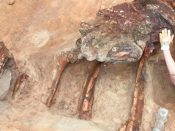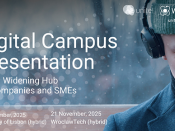“And even if we did succeed in doing so, it would still remain true, that the machine would remain utterly devoid of original initiative and would only do the special kind of thing it had been calculated to do. This, however, is no defect in a machine; we do not want it to do its own business, but ours.” C.S. Peirce Logical Machines (1887)
The study of computational aesthetics in the combination of computer science and A.I. examines how machines can assess aesthetics or display creativity or mimic aesthetic behavior. This field does not require artificial consciousness but instead relies on stochastics, algorithms and models that can imitate human aesthetic judgments or generate aesthetic outputs that might be judged by humans as aesthetically valuable. A.I. utopias envision a future where machine learning agential systems are not only tools engaged for efficiency, convenience, substitution of work or programmed profit but as well as explorations of the aesthetic and the sensible and intervene into our social common.
Still, AI systems might be proposed as a means for promoting the common good, public interest, fostering green transition, and even human values that underlie our diverse societies and ecosystems. What consequences do diverse forms of A.I. aesthetics, social-ethical and political participation in algorithmic society entail today? What praxeology of humanities must engage us concerning increasingly ubiquitous, intimate, affective calculations, computation and design by machine learning, and the cybernetic formalizations of human cultural techniques such as language, among others, for safeguarding our common futures?
In the early days of computer-generated art (Jones et al. 2023) from the 1950s onwards the works of computer art pioneers were influenced by mathematics, geometry, physics, combinatorial writing, and music, as well as by abstract art movements such as constructivism and op art. They were often experimental, exploratory, and playful, as the artists discovered new possibilities and limitations of the machines and their co-creativity, which reflected the social and cultural changes brought by the computerization of society. As computer technology evolved, artists began to use algorithms and other mathematical rules to create art- often to the detriment of the materiality (Nake 2010:60) aspect of the work. However, the value of the works was always debated, as early works were often seen as aesthetic design rather than art as it was frequently “biased toward attracting the attention of our brain’s most basic pattern-recognition skills”(Barrow, 1995 cit.in: Taylor, 2004:148) lacking artistic “resonance.”
We want to investigate the following questions among others:
- Do A.I. generations enhance aesthetic indeterminacy (Zeilinger 2023) by enabling social scaffolding, diagrammatic reasoning, abduction, human Learning, and development, and contribute substantially to the UNESCO 2030 development goals?
- How is democratic participation changed by A.I.Aesthetics?
- Does AI-generated art serve the interests of powerful digital platforms that exploit users’ data and historical works and labor by using A.I. as a marketing, influencer, and manipulation tool or a surveillance device that collects personal information and preferences?
- Is A.I. aesthetics praxis diminishing the reality index in which mean/demeaning images (Steyerl 2023) feed on latent spaces of exchange value, use value and commodity (cf. Adorno), critically assessed as based on a wrong idea of intelligence that could be designated dependently its perspective, “uncreative intelligence” (Mersch), “Artificial idiocy” (Zizek), “dumb meaning” (Bajohr 2022), or a satisficing (Hubert Simon) “cliché-generator”?
- How does A.I. Aesthetics relate to society?
- How did A.I. aesthetics co-evolve, mix, change and differ from other computer art and electronic arts, game aesthetics, beginning and aesthetic developments?
- Are the new A.I. tools living up to their metaphors such as machine “hallucinations” or “dreams” (DeepDream) or even “windows into alternate realities in the latent space” (Emad Mostaque, Twitter, 7/3/2023)?
- How A.I. aesthetics is related to social scaffolding, diagrammatic reasoning, abduction, human Learning?
- How can we reach out from Style transfer of A.I. remakes/remixes to societal vision transfer?
- How is Governance of A.I. through democratic processes and AI aesthetics strengthened or weakened?
- What role does A.I. aesthetics play in architecture, urban planning, green, digital transitions, and questions of the digital-sensible divide?



















